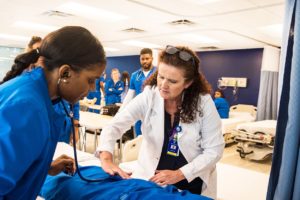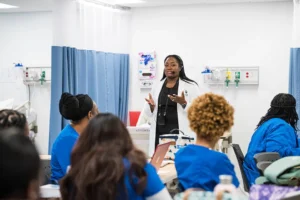A rewarding and impactful profession, nursing is one of the most important roles in the entire healthcare system. Registered nurses assess patient health, coordinate their care with other medical professionals, and educate individuals / communities about health. They collaborate with other health professionals including physicians, advanced practice nurses, social workers, and therapists.
If you are reading this piece, you’re likely wondering how to become a registered nurse (RN) in Florida. With multiple pathways to become a nurse and many choices for educational programs, it can be overwhelming to understand the process. In this blog, we’ll review the educational process required to become a registered nurse in Florida. This includes education pathways, how to find the right nursing program, finding an accredited program, sitting for the NCLEX-RN exam, and ultimately obtaining a Florida RN license. Let’s get started.
Choose a Nursing Education Path

ADN vs. BSN Program Length
These two nursing education programs vary in length. ADN programs are usually two-year degree programs while BSN programs are generally three to four-year degree programs. Since ADN programs are shorter, the curriculum has less content than a BSN program. ADN programs often do not include coursework on nursing research, leadership, ethics, or health policy. BSN programs typically incorporate these subjects in their curriculum.
Should You Pick ADN or BSN?
Many students wonder which degree program is right for them. For students looking to enter the nursing field as quickly as possible and who are not as concerned about nursing job advancement in the future, an ADN program could make sense.
Ultimately, a BSN degree is often a better choice for several reasons. First, many employers report preferring to hire BSN prepared nurses because of the wider breadth of preparation they receive. They also prefer BSN graduates because studies show that BSN prepared nurses contribute to better patient outcomes, and quality of care compared to their ADN prepared counterparts (6).
Another advantage of obtaining a BSN is that prior coursework can be used as a bridge to obtaining a higher nursing degree. The BSN is a prerequisite for many advanced practice nursing programs such as a master of science in nursing (MSN) degree.
Find a Quality Nursing Program
After choosing an ADN or BSN degree, the next step is finding a quality nursing education program. There are two critical requirements for a quality nursing education. The first is the state approval for the nursing program. State approval is granted by Florida’s Board of Nursing. Students can use the State of Florida’s nursing education database to ensure they are considering a Florida Board of Nursing (BON) approved program.
The second thing students should look for is a nursing program with accreditation. Accreditation helps future healthcare employers know that you were educated in a school using best practices in nursing education.
When a nursing program achieves accreditation, it means it has met rigorous education quality standards by the accreditors. The program has proven to meet its’ stated mission, goals, and learning outcomes for its students. Even after achieving accreditation, nursing programs must continue to show the accrediting body that they are meeting quality standards regularly to maintain accreditation status.
There are several independent bodies that accredit nursing programs. One of the most respected organizations is the Collegiate Commission on Nursing Education (CCNE). This organization is affiliated with the American Association of Colleges of Nursing (AACN). CCNE is officially recognized by the US Secretary of Education as a national accreditation agency for nursing programs.
Not all nursing programs are accredited, so it is critical for future nursing students to verify that the program they wish to enroll in is accredited.
All states, including Florida, require students to show proof of graduation from a state- approved nursing program in order to obtain an RN license and work in the state. Some healthcare employers validate that the nurses they hire are graduates of an accredited program as this is preferred from the employer perspective as well.
All this to say, you must find an accredited nursing program that will provide a quality education and prepare you for a successful nursing career.
Learn Nursing Skills & Theory

Clinical judgement is one of the most important concepts in a nursing curriculum. In today’s healthcare field, nurses are asked to exercise clinical judgment to make critical healthcare decisions for their patients. This important skill will be emphasized through nursing school and assessed on the NCLEX-RN licensing exam. An effective nursing program will help you to practice your clinical judgement skills through multiple learning modalities, but it’s also key that you practice clinical judgement in your own time.
Gain Real-World Experience in Clinicals
Nursing school will also include clinical experiences for students. Clinical experiences include both real patient care settings such as a hospital and healthcare simulations designed to help you practice skills. Under the guidance of a qualified nursing instructor, students begin to apply classroom concepts in the real world. These experiences aim to combine didactic learning with hands-on learning and allow students to practice essential psychomotor and cognitive nursing skills. The clinical judgment process is brought to life in the clinical setting and in simulation. These real-world experiences are invaluable learning tools for students. They allow students to synthesize didactic knowledge into real or simulated patient care scenarios while under the supervision of a nursing instructor.
Graduate from a BSN or ADN Program
Depending on the program you choose (ADN or BSN), you will graduate from your degree program in about two to four years. To reiterate, you must earn either a BSN or ADN degree to be eligible to become an RN. The time you invest in completing your education will be the longest part of your journey to become an RN. However, the time you spend in school will prepare you to successfully pass your NCLEX-RN exam, and transition to practice nursing in the real world.
Pass the NCLEX-RN Exam
After successfully finishing an BSN or ADN program, a student is is eligible to apply to sit for the NCLEX-RN examination. This is the certifying examination that all registered nurses must pass to earn the credential “RN.” The NCLEX-RN exam was redesigned in 2023 as the Next Generation NCLEX to better measure the clinical judgment of new graduates, given the importance of this skill. This is why honing clinical judgment during school is so essential!
Overview of the NCLEX-RN Exam
Developed by The National Council of State Boards of Nursing (NCSBN), the NCLEX-RN exam’s Test Plan is organized into four major categories, including:
- Safe and Effective Care Environment (management of care and safety and infection control)
- Health Promotion and Maintenance
- Psychosocial Integrity
- Physiologic Integrity (basic care and comfort, pharmacologic and parenteral therapies, reduction of risk potential, and physiologic adaptation)
The following processes are also integrated into the test plan content as well:
- Caring
- Clinical Judgment
- Communication and Documentation
- Culture and Spirituality
- Nursing Process
- Teaching/Learning
Administration of the NCLEX-RN Exam
The NCLEX-RN exam is administered at secure testing centers and consists of a minimum of 85 items. The maximum number of items that a test-taker may answer is 150 during the five-hour testing period. In a minimum length examination, 52 items will be derived from the eight content areas and eighteen items will include clinical case studies that specifically aim to measure clinical judgment ability.
Prospective nurses should also understand that the test is also a computer adaptive test (CAT). This is a method of examination during which the test itself modifies or adapts to the test-taker’s ability while ensuring that all areas of the test plan are administered. The exam continues until the candidate achieves either a pass or fail determination.
NCLEX-RN Preparation
The thought of taking the NCLEX-RN exam can be overwhelming. However, there are strategic steps you can take to ensure success, even in the beginning stages of your journey to become an RN.
Applying yourself while in school is one of the best ways to prepare for the exam. In addition, getting comfortable with using computer test-taking and completing practice questions will help set students up for NCLEX-RN success. Your faculty will also help guide and prepare you for the NCLEX-RN exam. If you feel you need extra preparation, reach out to your faculty as they may be provide you additional feedback or resources to get you ready for the exam.
Apply for an RN License in Florida
After passing the NCLEX-RN examination, the final step is to apply for an RN license in Florida. The NCSBN communicates NCLEX-RN results to the state board of nursing where you wish to become licensed, in this case, the Florida BON. Florida RN applicants also must provide proof of graduation from an approved nursing program and undergo fingerprinting and pay all applicable fees. Upon passing the licensure examination, the Florida BON will issue initial licenses within 7-10 business days. All of this information on how to become a nurse in Florida can be found here at the Florida BON website.
Start Your Future in Nursing Today

Why Choose Arizona College of Nursing?
- Earn a BSN degree in 3 years or less with eligible transfer credits
- Campus locations throughout the US
- Night classes for general education courses
- Hybrid Online/In-Person format for general education classes
- Nursing education is all we do
- CCNE-Accredited Program*
- NCLEX-RN success coaches and exam preparation class
- Financial aid available to those who qualify
Discover Your Path to a Career in Nursing
Citations
- AACN. CCNE Accreditation.
- AACN. The Impact of Education on Nursing Practice.
- Florida Board of Nursing. Licensed Practical Nurse & Registered Nurse by Examination.
- NCSBN. Next Generation NCLEX-RN Test Plan.
- BLS. Occupational Outlook Handbook. Registered Nurses.
- Healthcare Employers Prefer BSN graduates.
Information in this post is accurate as of .
*The Bachelor of Science in Nursing (BSN) degree program at Arizona College of Nursing is accredited by the Commission on Collegiate Nursing Education (https://www.aacnnursing.org/). All Arizona College of Nursing and Arizona College campuses are institutionally accredited by the Accrediting Bureau of Health Education Schools (https://www.abhes.org/), a U.S. Department of Education-recognized national accrediting agency.

